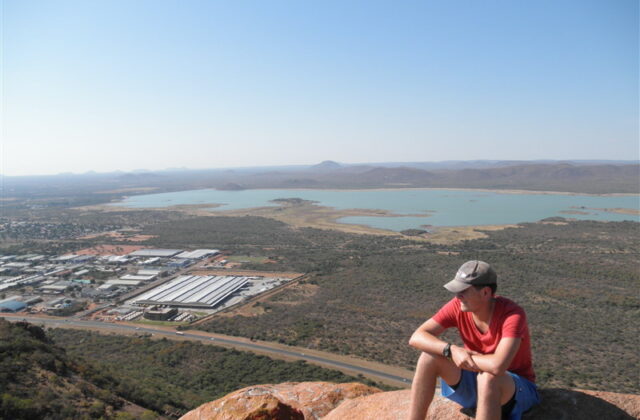Ian Robinson: An Educational Safari
By Joel Howard
Maru-a-Pula, a name which translates to “promise of blessings”, is an apt name for the innovative African school where Norfolk resident and recent high school graduate Ian Robinson is spending time as a volunteer teaching assistant. The educational facility, established in 1972, has grown from a student enrollment of 25 to 660, giving testament to the success of the original intention of building a center of non-racial learning.
The co-educational school is located in Gaborone, the capitol city of Botswana. According to Robinson, the school is infused with a self-help spirit that complements the school’s mantra of setting students’ aspirations as high as can be imagined. A daily reminder of that can-do attitude is found on campus: when staff and students dreamed of a swimming pool, they set about digging the hole themselves.
Robinson, who travelled to Africa in January, is taking a break before starting college, embarked on what is commonly referred to as a “gap year”. While working at Maru-a-Pula, he has found the differences from the typical American school to be significant – and inspiring. Students must complete weekly school-sponsored services, such as delivering food to the poor. Robinson participates in these events, helping wherever he can.
“I travelled with a group of students to paint a house in Old Naledi, one of the poorest and most dangerous regions of the city,” he said.
Teaching assistants and interns come from all corners of the world, yet another tool the school utilizes to have the students dream beyond their current situation. And the pupils obviously are affected by such interaction.
“Despite the adversity, it still amazes me that African students are able to overcome so many obstacles to have a shot at a tertiary education. Maru-a-Pula’s connections and support help students to achieve very ambitious goals.”
The pupils’ enthusiasm and eagerness to learn has also directly helped Robinson: his work at tutoring has been made much easier with such willing tutees.
Maru-a-Pula is in many ways a very unique school. In Southern Africa, schools are run predominantly along the same model used in England. This means an adherence to prescribed uniforms and strict traditions. Progressive and holistic in its approach to education, Maru-a-Pula does not follow the traditional hierarchal system of its counterparts. In fact, compared to the history of other regional private schools, Maru-a-pula is, according to Robinson, “the young hippie kid from the wrong side of town.”
To encourage students’ educational continuation beyond Maru-a-Pula, there is significant support on offer to students. A handful of students are annually chosen to spend their next two terms studying and preparing for a year abroad at partner high schools across the US and occasionally Europe. From there they usually are able to apply and get into some of the finest institutions in the world.
The Botswana government also usually provides total financial assistant to students who achieve a very high score on their exams. Together, private and public sources have honed a system of success that has elevated countless young lives over the span of forty years.
Upon his return next month, Robinson will no doubt be a changed young man. He is effusive about his experience, especially Maru-a-Pula. “It is in my opinion a shining example for schools across the continent.”
He will not have much time to rest, as he himself will be moving forward with his education, planning studies in Chinese and International Relations/Business. He’ll be closer to home this time, attending Trinity College in Hartford. No doubt the experiences of the past several months will in some part shape his future at Trinity and beyond.

